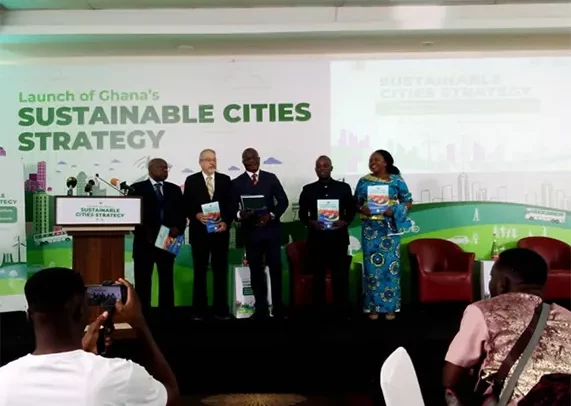The minister (middle) with other dignitaries during the launch of the GSCS document
The Ministry of Local Government, Chieftaincy and Religious Affairs (MLGCRA) launched the Ghana Sustainable Cities Strategy (GSCS) document in Accra on May 4, 2025.
The GSCS initiative is a national policy designed to direct the country’s urban areas toward sustainable, inclusive, and resilient growth.
The Minister of Local Government, Chieftaincy and Religious Affairs, Ahmed Ibrahim, explained that the purpose of the strategy document is to ensure that the needed measures to prevent problems such as urban poverty and the emergence of slums, as Ghana rapidly urbanises, are available and easily accessible.
“Not too long ago, Ghana’s urban population was 30% as compared to the 70% from the rural areas; now the urban areas are expanding and are even more than the rural areas.
“Possibly, very soon, everywhere is going to become an urban area, and if not properly planned, a lot of difficulties are going to arise, difficulties such as urban poverty, poor sanitation and the emergence of slums, so there was a need to create this strategy to mitigate the effects of rapid urbanisation and make sure our urban cities look the way we want in future,” he explained.
He also added that this initiative is a collaboration between the World Bank, the National Development Planning Commission and the MLGCRA, and said that the government was committed to making sure the strategy is not left on the shelves.
The Division Director for Ghana, Liberia, and Sierra Leone, Western and Central Africa Region, Dr. Robert Taliercio, stated that the document has the potential to unlock economically relevant job creation opportunities, and added that the success of the strategy hinges on strong partnerships.
“The strategy offers the potential to unlock economically relevant job creation opportunities, but its success hinges on strong partnerships, particularly with the private sector, to turn these strategic recommendations into impactful actions. The World Bank stands ready to support the implementation of the GSCS, working together to ensure that Ghana’s urban areas grow in a way that is resilient and more prosperous for all,” he said.
The Deputy Minister for Local Government, Chieftaincy, and Religious Affairs, Rita Naa Odoley-Sowah, implored relevant stakeholders, especially development partners, to buy into the recommendations to guide their financing strategies and support to the government for inclusive and sustainable urban development.
By Vera Owusu Sarpong


